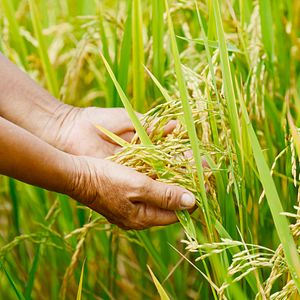It says much for the current junta’s ability to govern Thailand that they have chosen to exploit the very same idea, or one very near to it, which last year led them to depose their sworn enemy—former Prime Minister Yingluck Shinawatra. Or at least that was the feeling after Deputy Prime Minister Somkid Jatusripitak unveiled on October 16th a ‘swoosh’ styled, long-term program to kick-start the country’s lagging economy that featured front-and-center a… rice subsidy scheme.
Somkid was nevertheless quick to point out that this new version is far better than that which Yingluck’s government introduced (cue raising of eyebrows.) While Yingluck’s government subsided rice farming by paying an inflated price for the crop, the junta’s scheme paid farmers a direct cash handout last year of 1000 baht per 0.4 of an acre. Yes, there are additional inclusions to the junta’s 35 billion baht plans to boost Thailand’s agricultural structure, such as in diversification of crops, but in essence there is little difference between these plans and those that Yingluck’s government sought to implement. Which tells us one thing: the junta is, to be perfectly blunt, entirely out of ideas.
Implementing a policy of this nature in the same week that Yingluck was threatened with having her assets seized to compensate for the alleged failures of almost the exact same policy – a move that has been initiated entirely outside the legal system – is a perfect example of Thailand’s cognitive dissonance. Somkid might be making the right kind of noises about encouraging the Thai people to generate their own wealth and attracting foreign investment (a ridiculous proposition given the current political climate), but the answer so far still seems to revolve around throwing money at the problem and hoping it goes away. As a result of the 2014 coup, the economy is in crisis and no amount of back-pedaling can change that fact. GDP growth was halved compared to the rate expected last year, while exports are set to contract by a worse-than-anticipated 5 percent year on year.
Blast from the past
When Yingluck Shinawatra introduced what became known as the ‘Rice Scheme,’ she continued her brother Thaksin’s policy of currying grassroots support in the poorer agricultural areas of the north and north-east in order to foster a power base there that could rival that in Bangkok. With over a third of Thailand’s entire population involved in rice farming in some form or other and a purchase price guaranteed that was 50 percent higher than was the usual, Yingluck needed to do little else to secure the support of a now enthusiastic electorate. A significant improvement on her older brother’s earlier attempts to empower the northern electorate through cheap mobile phone deals, Yingluck nonetheless became the second Shinawatra to fall foul of Bangkok’s powerful military.
Political gain may have provided the impetus behind the Shinawatra clan’s courting of the north and north-east, but Thaksin and his sister have played an important part in bringing a forgotten section of society back into political play. The northern regions were, in effect, almost solely responsible for putting two governments in power, governments that were subsequently deposed by Bangkok’s elite. For the first time, the rural north felt it had been given a voice, and Bangkok had dismissed that voice with the most arrogant indifference possible. In a country where two percent of the population is responsible for 80 percent of the wealth, the men and women of Thailand’s paddy fields united for the first time and stood in defiant protest against their urban masters.
Somkid’s ‘new’ rice scheme would seem to point to the possibility that the junta itself has awoken to the reality of Thailand’s political system and the changing landscape of its society. Aware that supporting upwards social mobility for the good of the nation’s economy involves aiding the farming population, Bangkok’s powerful minority seems to have made a calculated step by seeking out a middle ground: robbing the Shinawatras of their political monopoly over Thailand’s poorest.
What is worrisome, however, is that in Thailand’s context, the junta seems to have resorted to trying to buy off the voice of the opposition while still attempting to put its own mechanisms of governance in place—mechanisms that are as disconnected from democratic rule as the government’s rice scheme is innovative.
The junta has no intention of releasing its hold on the reins of power until at least 2017. Holding up their much-ridiculed “6-4-6-4 road map to democracy” as the reason for this delay, a 20 month timetable of events leading up to the next planned election, to the more cynical observer it is no coincidence that this timeline coincides with the decline in health of an ailing king. At best, Thailand has yet to suffer another two years at the hands of a government whose idea of economic planning is to base its growth plan upon the logo of a major sportswear brand.
At worst, however, we could be witnessing the formation of a long-term military dictatorship, disguised in civilian dress but nonetheless run by the military through the obsequious guidance of a puppet prince that centuries of cultural conditioning has taught the Thai people not to question. Let us just hope, to badly misquote the poet Robert Burns, that on this occasion, the best laid plans of rice and men do indeed go oft astray.
Rob Edens is a London-based researcher.

































